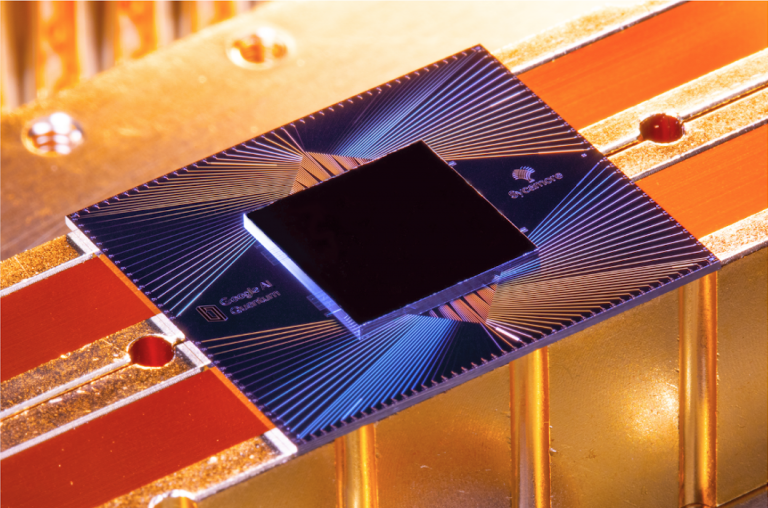UCLQ on ‘Quantum Supremacy’
23 October 2019
Insight from UCLQ academics on Google’s quantum supremacy claim and IBM’s criticisms.

In a paper published in Nature today, Google said its research lab in Santa Barbara had achieved ‘quantum supremacy’ using their quantum processor named ‘Sycamore’ - a two-dimensional array of 54 transmon qubits.
Google’s researchers report that they were able to create quantum states on 53 qubits, corresponding to a computational state-space of dimension 253 (about 1016), and that their processor takes about 200 seconds to sample one instance of a quantum circuit a million times. They assert that this sampling task demonstrates the experimental realisation of quantum supremacy because by Google’s estimate an equivalent task by a state-of-the-art classical supercomputer would take approximately 10,000 years.
However yesterday, a competing research group at IBM questioned Google’s breakthrough in a blog post, stating that “an ideal simulation of the same task can be performed on a classical system in 2.5 days and with far greater fidelity.” Further noting that, “This is in fact a conservative, worst-case estimate, and we expect that with additional refinements the classical cost of the simulation can be further reduced.”
UCLQ researcher Ciarán Gilligan-Lee said to New Scientist, “The type of quantum supremacy that Google and IBM are chasing here is really a moving target”. As quantum computers improve over time, so do classical computers – there’s always a new classical algorithm to test against the quantum ones, so the bar for quantum supremacy is continually raised. “Classical computers have such a large suite of things built into them that if you don’t utilise every single thing you leave yourself open for a tweaked classical algorithm to beat your quantum one.”
Jonathan Oppenheim, a researcher at UCLQ, said to The Telegraph that the problem was with the phrase ‘quantum supremacy’. Although the term is widely used in the field, it implies that quantum computers are now better than traditional computing. He also noted that: “While [Google’s result] is a milestone, it is very far from being a quantum computer that can compute anything useful.”
Has quantum supremacy been reached?
Many have questioned whether the task Google’s researchers used is a true demonstration of quantum supremacy arguing that their notion of quantum supremacy - based on executing a random quantum circuit of a size infeasible for simulation with any available classical computer – is not a full realisation of the milestone.
UCLQ’s Toby Cubitt said to Wired UK that the test for quantum supremacy should aim “to be something that gives you very high confidence, more than we've ever had before that quantum computer is doing something computationally that cannot be replicated on a classical computer.”
But UCLQ’s Ciarán Gilligan-Lee said that, even if you accept IBM’s claims at face value, Google’s quantum computer is still a big step forward.
“IBM is claiming that, even when running world’s largest computer for 2 and half days, and running petabytes of memory, they can simulate what the quantum chip does in 200 seconds. When you put it into context, it is still a pretty impressive achievement.”
It does not mean quantum computers are ready to tackle real-world problems. “But it is the first baby step on a long road to getting useful quantum computers,” says Gilligan-Lee.
UCLQ director John Morton says that, “Now that we know that even these relatively small-scale quantum processors can outperform vast supercomputers, the challenge is working out how to harness this power through customised quantum algorithms addressing real-world problems. Google’s milestone of achieving quantum supremacy marks the starting gun in the race to develop practical quantum computing applications for today’s noisy, intermediate-scale quantum computers.”
Is the term quantum supremacy useful?
The concept of quantum supremacy has attracted controversy. Originally the term was proposed by John Preskill, to “describe the point where quantum computers can do things that classical computers can’t, regardless of whether those tasks are useful.”
Preskill recently reflected on the term in Quanta Magazine. He summarized the two main objections to the term that have arisen from the community by explaining that the “word exacerbates the already overhyped reporting on the status of quantum technology” and that “through its association with white supremacy, evokes a repugnant political stance.”
The term “quantum supremacy” is a non-technical term that can be interpreted to mean different things, causing an ever-growing amount of confusion. It must also be noted that it is unlikely for quantum computers to reign “supreme” over classical computers, but rather they will work together with classical computers, because each have their unique strengths.
However, it is also the case that the term and debate is generating interest in the field and attracting a whole new generation to the challenges of quantum computing.
Read more comment from UCLQ academics:
- IBM hits back at Google's claim of 'quantum supremacy', The Telegraph
- IBM says Google may not have reached quantum supremacy after all, New Scientist
- It’s official: Google has achieved quantum supremacy, New Scientist
- Google's quantum breakthrough means quantum's finally getting serious, WIRED UK
CAPTION: Photography of Google's quantum Prcessor chip Sycamore. Credit: Erik Lucero, Google
COMMUNICATIONS CONTACT: Henry Bennie, UCL Quantum Science and Technology Institute
 Close
Close

